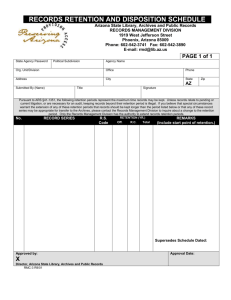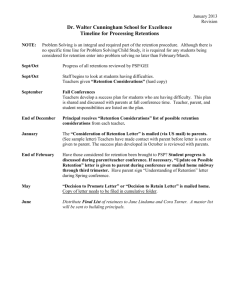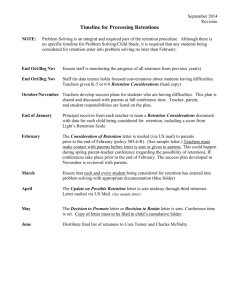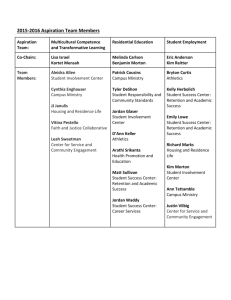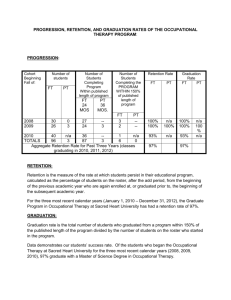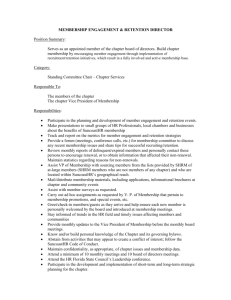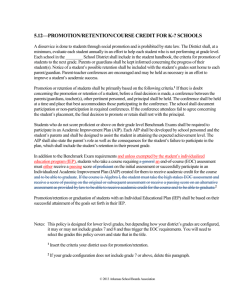What Factors Affect Retention in the Classroom
advertisement
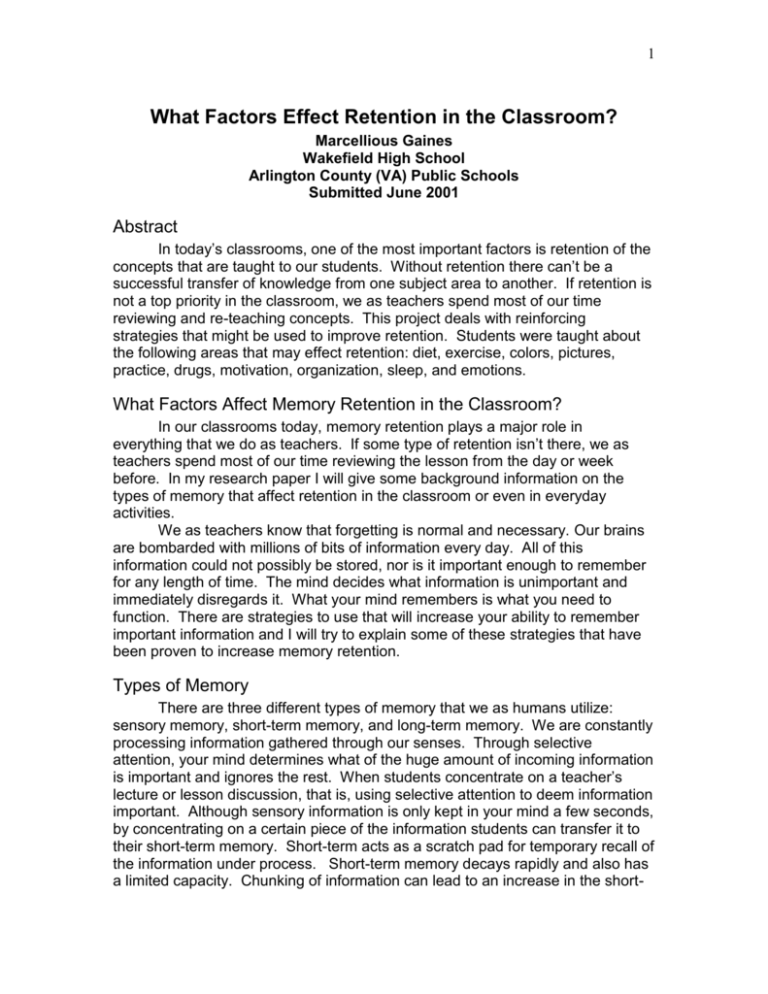
1 What Factors Effect Retention in the Classroom? Marcellious Gaines Wakefield High School Arlington County (VA) Public Schools Submitted June 2001 Abstract In today’s classrooms, one of the most important factors is retention of the concepts that are taught to our students. Without retention there can’t be a successful transfer of knowledge from one subject area to another. If retention is not a top priority in the classroom, we as teachers spend most of our time reviewing and re-teaching concepts. This project deals with reinforcing strategies that might be used to improve retention. Students were taught about the following areas that may effect retention: diet, exercise, colors, pictures, practice, drugs, motivation, organization, sleep, and emotions. What Factors Affect Memory Retention in the Classroom? In our classrooms today, memory retention plays a major role in everything that we do as teachers. If some type of retention isn’t there, we as teachers spend most of our time reviewing the lesson from the day or week before. In my research paper I will give some background information on the types of memory that affect retention in the classroom or even in everyday activities. We as teachers know that forgetting is normal and necessary. Our brains are bombarded with millions of bits of information every day. All of this information could not possibly be stored, nor is it important enough to remember for any length of time. The mind decides what information is unimportant and immediately disregards it. What your mind remembers is what you need to function. There are strategies to use that will increase your ability to remember important information and I will try to explain some of these strategies that have been proven to increase memory retention. Types of Memory There are three different types of memory that we as humans utilize: sensory memory, short-term memory, and long-term memory. We are constantly processing information gathered through our senses. Through selective attention, your mind determines what of the huge amount of incoming information is important and ignores the rest. When students concentrate on a teacher’s lecture or lesson discussion, that is, using selective attention to deem information important. Although sensory information is only kept in your mind a few seconds, by concentrating on a certain piece of the information students can transfer it to their short-term memory. Short-term acts as a scratch pad for temporary recall of the information under process. Short-term memory decays rapidly and also has a limited capacity. Chunking of information can lead to an increase in the short- 2 term memory capacity. That is why a hyphenated phone number is easier to remember than a single long number. The successful formation of a chunk is known as closure. Interference often causes disturbance in short-term memory retention. This accounts for the desire to complete the tasks held in short-term memory as soon as possible. Then we have the long-term memory, which is intended for storage of information over a long time. Once information is moved to long-term memory, it is integrated with existing information. If this integration is not successfully done, the information may get lost and will be harder to recall. Long-term memory is like a giant warehouse full of file cabinets. You take information you know and you place it in existing “files”. If there is no existing file and you do not create one by integrating like information, the information may be more difficult to recall. Reception Encourage the students to be very attentive and observant of the lesson. This will help important information to be retained more easily. Make sure all students are paying attention and listening to the lecture and discussion and taking notes. Encourage them to ask questions if they don’t understand some information that is being taught, because they don’t remember what they don’t understand. Encourage the students to survey the lesson before the next lesson. If they know what the selection is about before reading, they will be more attentive to the lesson. Conscious Effort Encourage students to make a conscious effort to remember what is being said. Taking notes and reviewing them afterward increases students’ memories. Sometimes reciting notes aloud can help with retention. Making sure homework is assigned to students on a regular basis also helps them become actively involved in the lesson. Accountability Make sure the students are held accountable for a notebook. Make sure they correct all papers that are handed back to them and that they organize their papers by chapters or lessons. Make sure the students understand the goals in each lesson that is being taught. Also encourage students to go back and study a week before the test, possibly about 2-3 hours a week. Students should take breaks when studying. You could also give the students practice tests to study so they can be familiar with the evaluation. Exercise There is an abundance of evidence citing the general benefits of exercise. Students should be encouraged to participate or take part in some form of aerobic exercise, such as walking 20 minutes at least three times a week. This stimulates the blood flow and the delivery of essential oxygen to the brain. 3 Routines If we as teachers encourage students to write down the homework assignments or a “things to do list” on a regular basis, it will decrease the number of students that forget to complete an assignment. You might even want to take up the students’ list of homework assignments at the end of each week and grade them. Colors Without a contrast in colors, things may get a little boring. There was a study done by a sixth grader who wanted to know if colored words would be remembered better than those in black and white. Her conclusion was that girls remembered colored words better than black and white. The average number of color printed words that were remembered by girls was 7.5. She also reported the boys remembered colored words better than black and white. The average number of colored printed words remembered was 8. The average number of black printed words remembered by boys was 6.9. Alcohol Students should be encouraged to not drink alcohol at an early age and not just because of the law, but because alcohol can change the functions of their brain. Researchers at Duke Medical Center and the Durham Veterans’ Affairs Medical Center have concluded that just two alcoholic drinks can inhibit 4 the short-term memory of 21 to 24 years olds. The research team, led by Clinical Professor of Psychology Scott Swartzwelder, a VA Medical Center researcher and University neuropsychologist performed an experiment on two groups of people who typically drink up to four drinks each week, half aged 21 to 24 and half aged 25 to 29. Subjects were given the equivalent of two drinks and asked to take simple memory tests. The results demonstrated that subjects aged 21 to 24 performed 30 percent worse that those aged 25 to 29 on the memory tests. The effects of alcohol on underage drinkers may be even more severe because their brains’ nerve cells and receptors are still be molding into a mature form. Pictures The saying a “picture is worth a thousand words” is usually applied to the effectiveness of a picture in communicating an idea that would take many words to express, but it may also apply to the effectiveness of a picture in remembering what was communicated. There was a study done with a group who were shown 2,560 different pictures over a period of several days. They were later shown 280 pairs of pictures. One of each pair was a picture the person had seen before and the other was not. The people were asked to indicate which of the two pictures they had seen before. In this recognition task they correctly identified about 90 percent of the pictures. Later another study was done with as many as 10,000 pictures and it also found that picture memory exceeds word memory when measured by recall as well as by recognition. In my geometry and algebra class I try to use a picture or an example for every concept that I really want the students to retain. These examples are really for them to be able to refer back to when they need to recall a concept without spending too much time. Some people call this a quick reference. Foods That Might Effect Your Memory Choline, a substance found naturally in many fatty foods, may improve memory, according to a recent report published in the Journal of the American College of Nutrition. Dr. Steven Zeisel, from the School of Public Health and School of Medicine at the University of North Carolina, reported that choline, when added to a mother’s diet during pregnancy, boosted memory retention later in life for the developing fetus. Students can be reminded about the foods that may increase memory such milk, liver, eggs, and peanuts. One easy way to help your memory is to reduce your intake of carbohydrates—grains (such as cereals, bread, rice, pasta), potatoes, as well as sweetened foods and drinks. When your foods provide limited glucose, your blood glucose level will remain steadier, without peaks and deep dips. Foods such as potatoes, bread, and sweet pudding will fluctuate your sugar level and even though some are healthy, memory may suffer. A sweetened snack – for instance, a sugar coated doughnut in the middle of the morning – will send the blood sugar soaring in a very short time, only to dip later to an uncomfortable low. Another factor that affects our memory, in addition to glucose, relates to water. Did you know our brains are 75% water? What does that tell you? We 5 need to encourage students to drink sufficient amounts of water so their brains don’t become dehydrated. Six to eight glasses of good quality water every day is recommended by nutritionists. Coffee, tea, and soft drinks are not included as they act as diuretics, pulling water out of our bodies. Meaningfulness One of the determinants of how easy something is to learn is how meaningful it is to the learner. If it doesn’t make sense, it will be hard to learn. The more meaningful it is, the easier it will be to learn. We as teachers need to make sure the students are clear on why they need to learn certain material that is being taught and emphasize those things versus others. In an old study that shows the effect of meaning on learning, people memorized a list of 200 nonsense syllables, a 200-word passage of prose, and 200 words of poetry. The nonsense syllables took about 1.5 hours to memorize, while the prose took less then a half-hour, and the poetry took about 10 minutes. Many of the principles such as association, visualization, and organization help make material meaningful. In addition, there are other principles such as familiarity, rhymes, patterns, and acronyms. Study Shows Sleep Helps Memory Forget about pulling an all-nighter before an exam – studies suggest it’s more important to get a good night’s rest. Harvard Medical School researchers, led by assistant professor of psychiatry Robert Stickgold, found that people who slept after learning and practicing a new task remembered more about it the next day than people who stayed up all night after learning the same thing. There was a study done with 24 participants and they were trained to identify the orientation of three diagonal bars flashed for one-sixth of a second on a horizontal-striped computer screen. Half of the participants went to sleep that night. The others were kept awake until the second night of the study. Both groups were allowed to sleep on the second and third nights. On the fourth day, both groups were tested on how proficient they had become at identifying the orientation of the diagonal bars. Those who slept on the first night performed better than they had on the first day. Those who didn’t sleep did not improve. “We don’t know a lot about sleep, but we do know that it is useful in terms of deciding what information is useful and what’s superfluous and can be discarded, “ said Joseph Modrack, an assistant professor of sleep medicine at the University of Rochester. “This study makes a lot of sense.” Things That I Did in My Classroom to Promote Memory Retention In my classroom, I tried to promote retention by giving my students factual information about things that would promote retention. I also gave them information about things that have been documented to decrease retention of information stored in the brain such as caffeine and too many carbohydrates. I gave them a four-food group chart, so they would know what the intake of a normal human being needs to really stay healthy. I also read to them about 6 things that might even cause other health issues such as high cholesterol and diabetes. I also did a survey that included the following questions: 1. Do you study on a regular basis between 2 to 4 hours a week, not including written homework? 2. Do you exercise on a regular basis, including sports at school? 3. Do you eat breakfast such as a fruit, cereal, or any breakfast-related food before going to school? 4. Do you eat a lunch during school? 5. Do your meals for lunch or dinner include any type of vegetables? 6. Do you eat at least one well-balanced meal a day? 7. Do you have a place that you can study quietly? 8. Do you ask questions in class or seek help during or after school if you don’t understand a concept? 9. Do you think if you practiced or studied more, your grades would be better? 10. Do you think your parents are interested in your schoolwork? 11. Are there situations at home that might prevent you from studying or doing homework? 12. Do you feel you are trying or doing your best in your classes? 13. Do you feel everything that I have asked you in this survey play a role in retention? 70 60 50 40 YES NO 30 20 10 0 #1 #2 #3 #4 #5 #6 #7 #8 #9 #10 #11 #12 #13 Reflections This project was very helpful because it gave me some information on how I can increase the retention of material that is being taught in the classroom. I believe if we as teachers would start with this promotion of retention in elementary schools, high school students wouldn’t have so many problems with remembering what had been taught. This wouldn’t just help the students with 7 retention, but would help them live a healthy life. It would also carry over into the everyday lives of these students such as remembering and organizing their thoughts on how to perform a task. Next year I plan to really increase the promotion of retention by putting up posters concerning healthy eating and the benefits. I am also going to assign my students projects that include healthy eating and relate it to my subject area of mathematics. This will probably lead to giving them quizzes or tests over the four food groups and on eating a well-balanced meal. This will be done on a consistent basis because I want the students to take this seriously. These things that I just mentioned should be reinforced starting in elementary schools and continuing throughout high school to really make an impact in the classroom. RAPHY References Bellezza, Francis S. (1982). Improve Your Memory Skills, Prentice-Hall, Inc. Higbee, Kenneth L., Ph.D. (1977). Your Memory/How It Works and How to Improve It, Prentice-Hall, Inc. Gallant, Roy A. (1980). How Memory Works and How to Improve It, Four Winds Press. Yount, Lisa. (1996). Memory, Lucent Overview Series, Lucent Books, Inc., Baddeley, Alan. (1982). Your Memory: A User’s Guide, Macmillan Publishing Co., Inc. Associated Press, “Study Shows Sleep Helps Memory”, Nov. 21, 2000 Anderson, Scheree, Henke, Jeanette, & McLaughlin, Maureen. (2000-01). Using Background Music to Enhance Memory and Improve Learning, MA Research Project, Xavier University, Peggy, Canning. (2000). MA, Your Brain Needs Glucose—but not Too Much. Retrieved from http://www.retiredlifefun.com. Zheman, Rami. (1998). Alcohol Inhibits Memory more in Young, (researcher’s report), Nov. 11, 1998. L., Mary. (1999-2000). The Effect of Color on Memory Retention of Items on a List, Science Project
